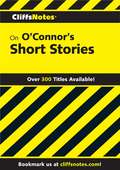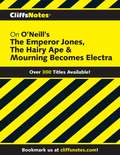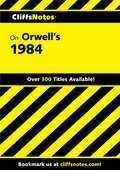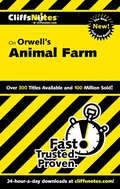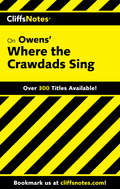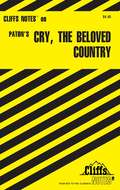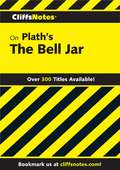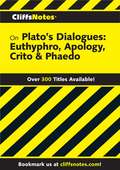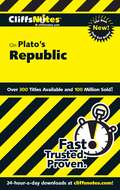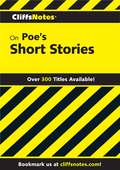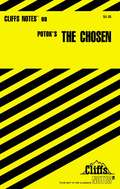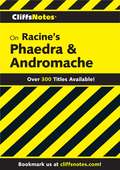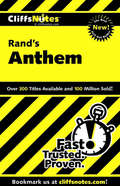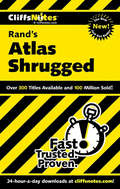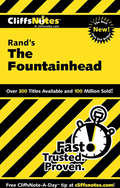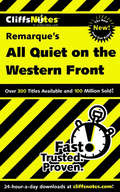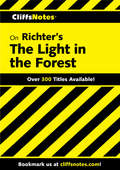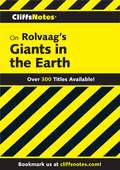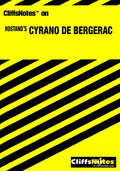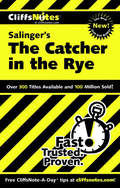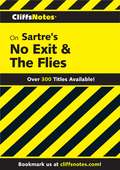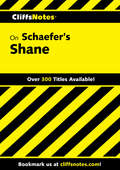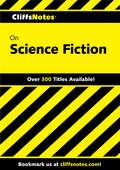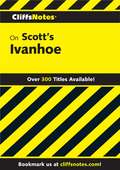- Table View
- List View
CliffsNotes on O'Connor's Short Stories
by Terry J. DibbleThis CliffsNotes guide includes everything you’ve come to expect from the trusted experts at CliffsNotes, including analysis of the most widely read literary works.
CliffsNotes on O'Neill's The Emperor Jones, The Hairy Ape & Mourning Becomes Electra
by James L. Roberts Peter ClarkThis CliffsNotes guide includes everything you’ve come to expect from the trusted experts at CliffsNotes, including analysis of the most widely read literary works.
CliffsNotes on Orwell's 1984
by Gilbert Borman Nikki MoustakiThe original CliffsNotes study guides offer expert commentary on major themes, plots, characters, literary devices, and historical background. The latest generation of titles in this series also features glossaries and visual elements that complement the classic, familiar format.CliffsNotes on 1984 introduces you to the modern world as imagined by George Orwell, a place where humans have no control over their own lives, where nearly every positive feeling is squelched, and where people live in misery, fear, and repression.Orwell's vision of the future may be grim, but your understanding of his novel can be bright thanks to detailed summaries and commentaries for every chapter. Other features that help you study includeCharacter analyses of major playersA character map that graphically illustrates the relationships among the charactersCritical essaysA review section that tests your knowledgeA Resource Center full of books, articles, films, and Internet sitesClassic literature or modern modern-day treasure -- you'll understand it all with expert information and insight from CliffsNotes study guides.
CliffsNotes on Orwell's Animal Farm
by Daniel MoranThe original CliffsNotes study guides offer expert commentary on major themes, plots, characters, literary devices, and historical background. The latest generation of titles in this series also features glossaries and visual elements that complement the classic, familiar format.The animals in CliffsNotes on The Animal Farm reflect different kinds of humans and their struggles for freedom and power. Orwell felt that a farm where "All Animals Are Equal" would solve many social and economic problems -- but he also knew that such a system would be difficult to maintain.Find out what happens on the farm when some of the animals act on the principle that "Some Are More Equal Than Others." You'll also gain insight into the life and political views of the author, George Orwell. Other features that help you study includeCharacter analyses of major playersA character map that graphically illustrates the relationships among the charactersCritical essaysA review section that tests your knowledgeA Resource Center full of books, articles, films, and Internet sitesClassic literature or modern modern-day treasure -- you'll understand it all with expert information and insight from CliffsNotes study guides.
CliffsNotes on Owens' Where the Crawdads Sing
by Curry KennedyThe perfect reading companion to Where the Crawdads Sing, this literature guide delves into the themes and characters and will enhance your reading experience of this wonderful book club choice!
CliffsNotes on Paton's Cry, the Beloved Country
by Richard O PetersonThe original CliffsNotes study guides offer a look into critical elements and ideas within classic works of literature.CliffsNotes on Cry, the Beloved Country takes you into a compassionately told story set in the troubled and changing South Africa in the 1940s.Focusing on a people who are caught between two worlds -- the old with its rituals and and respect and the new with its lack of values and order -- this study guide explores a novel of social protest through character analyses and critical essays. Other features that help you figure out this important work includeProfile of the author Alan Paton's life and workHistorical background of the troubled and changing South Africa of the 1940sCharacter web and in-depth analyses of the major rolesSummaries and commentaries for each chapter within the bookReview questions and suggestions for theme topicsClassic literature or modern-day treasure -- you'll understand it all with expert information and insight from CliffsNotes study guides.
CliffsNotes on Plath's The Bell Jar
by Jeanne InnessThis CliffsNotes guide includes everything you've come to expect from the trusted experts at CliffsNotes, including analysis of the most widely read literary works.
CliffsNotes on Plato's Dialogues: Euthyphro, Apology, Crito & Phaedo
by Charles H PattersonThese four dialogues cover time surrounding the execution of Socrates. As he was charged, tried, and condemned to death, the four dialogues stand as final testaments to his credo of virtue. These are texts that have shaped thousands of years of thought on the meaning of life and personal conduct.
CliffsNotes on Plato's The Republic
by Thomas ThornburgThe original CliffsNotes study guides offer expert commentary on major themes, plots, characters, literary devices, and historical background. The latest generation of titles in this series also feature glossaries and visual elements that complement the classic, familiar format Considered to be one of the three greatest philosophical tomes of all time, The Republic is Plato's account and interpretation of Socrates' ideas about life, meaning, and the just society. This text has provoked and shaped thought for thousands of years and is as applicable now as it ever was. CliffsNotes on Plato's Republic helps you explore these writings by providing you with summaries and commentaries, book by book. You'll also gain insight into the life and background of the author, Plato, and understand his growth as a philosopher. Other features that help you study include: A list of speakers and their descriptions Glossaries to help you fully understand new and unfamiliar terms Character analyses of Socrates, Thrasymachus, and others Critical essays on Plato's flyting, his childhood, and Leonidas A review section to test your knowledge with books, websites, and more for further study Classic literature or modern modern-day treasure--you'll understand it all with expert information and insight from CliffsNotes study guides.
CliffsNotes on Poe's Short Stories
by James L. Roberts J M LyberThis CliffsNotes guide includes everything you’ve come to expect from the trusted experts at CliffsNotes, including analysis of the most widely read literary works.
CliffsNotes on Potok's The Chosen
by Stephen J GreensteinThe original CliffsNotes study guides offer expert commentary on major themes, plots, characters, literary devices, and historical background.CliffsNotes on The Chosen reveals the condition of American Jews living in two cultures, one secular and one religious. In his classic novel, author Chaim Potok is describing not only the lives of the characters but his own life, as well.With this study guide, you'll be able to walk a mile in the shoes of a Jewish American of the 1940s. You'll also gain insight into the life of Potok and historical influences on this novel. Other features that help you study includeCharacter analyses of major playersA character map that graphically illustrates the relationships among the charactersCritical essaysReview questions and suggested writing topicsDiscussion of the firm version of the novel and how it compares to the original workClassic literature or modern modern-day treasure -- you'll understand it all with expert information and insight from CliffsNotes study guides.
CliffsNotes on Racine's Phaedra & Andromache
by George KlinThis CliffsNotes guide includes everything you’ve come to expect from the trusted experts at CliffsNotes, including analysis of the most widely read literary works.
CliffsNotes on Rand's Anthem
by Andrew BernsteinThe original CliffsNotes study guides offer expert commentary on major themes, plots, characters, literary devices, and historical background. The latest generation of titles in this series also features glossaries and visual elements that complement the classic, familiar format. CliffsNotes on Anthem is an excellent introduction to Ayn Rand's philosophy of human nature. The novella's theme and central conflict - the individual versus the collective - is an important element of her moral and political philosophy. This study guide will help you understand the story of Anthem which takes place in an unnamed Communist- or Facist-like dictatorship of the future. Meet the hero, Equality 7-2521, a brilliant young man who yearns to be a scientist but is held back by a government that fears his intelligence. Your grasp on this novella will be strong with these features that help you study: Character analyses of major players A character map that graphically illustrates the relationships among the characters Critical essays A review section that tests your knowledge A ResourceCenter full of books, articles, films, and Internet sites Classic literature or modern modern-day treasure -- you'll understand it all with expert information and insight from CliffsNotes study guides.
CliffsNotes on Rand's Atlas Shrugged
by Andrew BernsteinThe original CliffsNotes study guides offer expert commentary on major themes, plots, characters, literary devices, and historical background. The latest generation of titles in this series also features glossaries and visual elements that complement the classic, familiar format.CliffsNotes on Atlas Shrugged is your guide to author Ayn Rand's masterpiece, an impassioned defense of the freedom of man's mind. She shows that without the independent mind, our society would collapse into primitive savagery.Delve into the post-World War II historical context of Atlas Shrugged and the modern implications of its conclusions. Other features that help you study includeCharacter analyses of major playersA character map that graphically illustrates the relationships among the charactersCritical essaysA review section that tests your knowledgeA Resource Center full of books, articles, films, and Internet sitesClassic literature or modern modern-day treasure -- you'll understand it all with expert information and insight from CliffsNotes study guides.
CliffsNotes on Rand's The Fountainhead
by Andrew BernsteinThe original CliffsNotes study guides offer a look into key elements and ideas within classic works of literature. The latest generation of titles in this series also features glossaries and visual elements that complement the familiar format.CliffsNotes on The Fountainhead explores the modern classic that made Ayn Rand famous. The book carried forth the author's anti-communist ideals and conviction that individuals should not allow their lives to be dominated in any way by the beliefs of others.Following the story of architect Howard Roark as he attempts to achieve success on his own terms, this study guide provides summaries and critical commentaries for each part within the novel. Other features that help you figure out this important work includePersonal background on the author, including a look at the philosophy she termed "Objectivism"Introduction to and synopsis of the bookIn-depth analyses of a broad cast of charactersCritical essays on the author's writing style and moreReview section that features interactive questions and suggested essay topics and practice projectsResourceCenter with books, film and audio recordings, and Web sites that can help round out your knowledgeClassic literature or modern-day treasure -- you'll understand it all with expert information and insight from CliffsNotes study guides.
CliffsNotes on Remarque's All Quiet on the Western Front
by Susan Van KirkThe original CliffsNotes study guides offer expert commentary on major themes, plots, characters, literary devices, and historical background. The latest generation of titles in this series also features glossaries and visual elements that complement the classic, familiar format.In CliffsNotes on All Quiet on the Western Front, Erich Maria Remarque takes you inside the gruesome realities of World War I through the eyes of Paul Baumer, a sensitive teenager and typical infantryman in the German army.This study guide will help you begin to consider how Remarque's views on war might relate to modern-day conflicts. You'll also gain insight into the life and cultural background of the author. Other features that help you study includeCharacter analyses of major playersA character map that graphically illustrates the relationships among the charactersCritical essaysA review section that tests your knowledgeA Resource Center full of books, articles, films, and Internet sitesClassic literature or modern modern-day treasure -- you'll understand it all with expert information and insight from CliffsNotes study guides.
CliffsNotes on Richter's The Light in the Forest
by Mary Ellen SnodgrassConrad Richter, one of American literature's preeminent authors on the American frontier, highlights family hardship, individual suffering, and societal breakup in The Light in the Forest. Impeccably researched, Richter's novel takes place at a time of rapid change in the 18th century. True Son/Johnny is the protagonist, a white boy captured at the age of 4 by the Lenni Lenape Indians and later adopted as one of their own. Forced to return to his white family 11 years later, True Son/Johnny must address what it means to belong and face the consequence of defying those ties.
CliffsNotes on Rolvaag's Giants In the Earth
by Frank B. HugginsThis CliffsNotes guide includes everything you've come to expect from the trusted experts at CliffsNotes, including analysis of the most widely read literary works.
CliffsNotes on Rostand's Cyrano de Bergerac
by Larocque Dubose Estelle DuboseThis is the famous 19th-century play about a great swordsman and poet with the unseemly large nose. Although he is feared by opponents, he cannot court the woman of his dreams, except through anonymously sent poems, which makes for a romantic and adventurous tale.
CliffsNotes on Salinger's The Catcher in the Rye
by Stanley P. BaldwinThe original CliffsNotes study guides offer expert commentary on major themes, plots, characters, literary devices, and historical background. The latest generation of titles in this series also features glossaries and visual elements that complement the classic, familiar format.CliffsNotes on The Catcher in the Rye introduces you to a coming-of-age novel with a twist. J.D. Salinger's best-known work is more realistic, more lifelike and authentic than some other representatives of the genre. Get to know the unforgettable main character, Holden Caulfield, as he navigates the dangers and risks of growing up.This study guide enables you to keep up with all of the major themes and symbols of the novel, as well as the characters and plot. You'll also find valuable information about Salinger's life and background. Other features that help you study includeCharacter analyses of major playersA character map that graphically illustrates the relationships among the charactersCritical essaysA review section that tests your knowledgeA Resource Center full of books, articles, films, and Internet sitesClassic literature or modern modern-day treasure -- you'll understand it all with expert information and insight from CliffsNotes study guides.
CliffsNotes on Sartre's No Exit & The Flies
by W John CampbellThis CliffsNotes guide includes everything you’ve come to expect from the trusted experts at CliffsNotes, including analysis of the most widely read literary works.
CliffsNotes on Schaefer's Shane
by Gary K Carey J. L. RobertsThis CliffsNotes guide includes everything you’ve come to expect from the trusted experts at CliffsNotes, including analysis of the most widely read literary works.
CliffsNotes on Science Fiction: An Introduction
by L. David AllenThis CliffsNotes guide includes everything you’ve come to expect from the trusted experts at CliffsNotes, including analysis of the most widely read literary works.
CliffsNotes on Scott's Ivanhoe
by Norma OstranderThis CliffsNotes guide includes everything you’ve come to expect from the trusted experts at CliffsNotes, including analysis of the most widely read literary works.
CliffsNotes on Shaara's The Killer Angels
by Debra A. BaileyThe original CliffsNotes study guides offer expert commentary on major themes, plots, characters, literary devices, and historical background. The latest generation of titles in this series also feature glossaries and visual elements that complement the classic, familiar format. With CliffsNotes on The Killer Angels, you gain insight into the novel, which tells the story of the Battle of Gettysburg from the points of view of four main characters. Get a glimpse of the realities of war, with its losses and tragedies, and the motivations and deep emotions of the men there. This study guide carries you through this terrible and bloody event by providing chapter summaries and critical analyses. You'll also gain insight into life on the battlefield, the problems that officers and soldiers faced, how decisions were made, and the effect of those decisions. Other features that help you study includeCharacter analyses of major playersA character map that graphically illustrates the relationships among the charactersCritical essays and theme discussionsA review section that tests your knowledgeGlossaries of key words and termsClassic literature or modern modern-day treasure—you'll understand it all with expert information and insight from CliffsNotes study guides.
